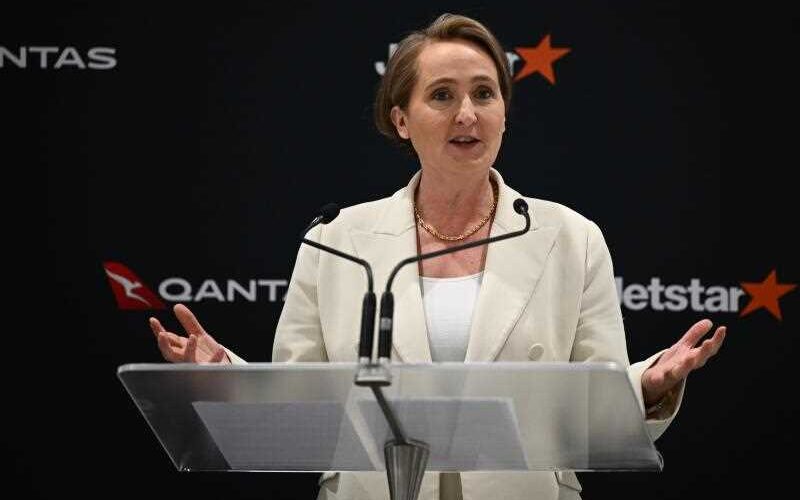CEO Vanessa Hudson’s strategy of making Qantas a majority low-cost airline has become clearer with the closure of Jetstar Asia subsidiary. The unions are not happy, Michael Sainsbury reports.
Vanessa Hudson’s strategic vision is facing pushback from increasingly restive pilot unions as Qantas continues to quietly move mainline routes to Jetstar and other subsidiaries, where flight deck and cabin crews are paid about 30% less.
A spokesperson for the Australian Federation of Airline Pilots (AFAP), which covers about 80% of Jetstar pilots, told MWM, “Jetstar Enterprise Bargaining Agreement negotiations are underway. Both parties are approaching discussions in good faith, and meetings have been going well to date with Jetstar management.”
However, the EBA does not expire until November, and things can go south quickly for the pilots when negotiating with Qantas’ aggressive industrial relations team. Qantas Freight pilots have moved a step closer to industrial action with the Fair Work Commission approving an application for protected industrial action on Thursday (June 11), with a pilot vote to begin Monday.
Qantas Freight holds contracts with Australia Post and FedEx, and strike action would severely interrupt the delivery of online purchases.
“After six months of negotiation, Qantas has refused to improve an offer that in some cases would see pilots paid less than if they were employed under the Air Pilots Award 2020 and would entrench poor work-life balance. A successful Protected Action Ballot Order would give more than 100 pilots the right to take industrial action,” The AFAP spokesperson said, “Qantas has based its offer on outdated aircraft that no longer fly,”
and in the last round of negotiations, threatened to remove back pay.
Jetstar losses
Meanwhile Qantas has admitted that Jetstar Asia would lose $35 million this year as it signalled the closure of the Singapore-based airline, the second of four planned Jetstar spinoffs to get off the ground and fail since Jetstar Pacific in 2012.
Jetstar Hong Kong failed to even gain a licence despite the backing of mainland airline China Eastern and being chaired by Pansy Ho, daughter of Macau gambling mogul Stanley Ho, and four years of lobbying at a reported price tag of $300 million.
All that’s left is a 30% stake in Jetstar Japan, which is controlled by rival Japan Airlines, and of course Jetstar Australia.
Jetstar Asia should have been closed years ago, but wasn’t, perhaps because it was seen as Alan Joyce’s vanity project.
The timing was triggered by a string of commercial imperatives including Qantas’s aircraft shortage, due to Joyce’s trade off between starting Jetstar Asia and ordering more planes for Qantas, and a looming capacity battle with soon-to-be-cashed up Virgin, as well as angry, highly profitable mining customers in Western Australia who want better, on-time planes from Qantas.
Wrong-headed and poorly executed, the Asia misadventure has been a bit of a schemozzle, highlighting the company’s misreading of the difficulties and nuances of doing business in Asian nations.
Jetstar Asia was always a much better experience than its domestic parent. But the Asian strategy, which allowed Joyce to swan around Asia capitals and rub shoulders with the likes of the Ho family, was prioritised over ordering new aircraft for its domestic and mainline international business, and it was always going to be outmatched by local low-cost carriers like Air Asia, Scoot and Vietjet.
Qantas said it would redirect the closed airline’s 13 A320 planes, and their destination is telling: nine to Jetstar and four to Perth-headquartered subsidiary Network Aviation.
As Qantas’ mainline domestic fleet has remained static at 75 for almost two decades, it has steadily increased capacity at its lower-cost, jet-flying subsidiaries Jetstar, National Jet Systems (NJS) and Network Aviation. Jetstar’s fleet now stands at 77, with another 29 on order for delivery by 2029.
Unhappy mining customers
The crisis amongst Qantas mining customers is very real, Perth-based Qantas sources told MWM. Vanessa Hudson and QantasLink chief Rachel Yangoyan flew to Perth last month to meet with mining bosses demanding better aircraft and on-time service, or they would walk away.
Network’s ancient Fokker 100s, Australia’s oldest commercial aeroplanes, are falling apart, and spare parts ceased to be manufactured long ago.
As part of its recent announcement, Qantas said it will retire four of the aircraft, and insiders say new replacements, in the form of second-hand Embraer E190S, are only weeks away. Network Aviation now has 14 A320S, second-hand and sourced from Jetstar and Jetstar Asia and 6 A319S, 20-year-old planes from US carrier Spirit, designed to service shorter runways found in WA mining airports.
WA miner, MinRes, has already started up its own airline, and others are understood to be eyeing the model. Rio Tinto recently secured service guarantees akin to the EU airline customer guarantees.
In an internal staff email obtained by MWM, Hudson said that the extra planes for Network would “…allow us to accelerate the retirement of a small number of F100s, increase our operational resilience and provide more capacity for our critical customers [miners] during peak periods.”
Virgin is also threatening Qantas’ FIFO business with an order of new E190 jets starting to arrive next year. As part of its upcoming IPO, Virgin said it would spend $1 billion on new aircraft and also has access to leased aircraft from 23% owner Qatar.
Pilots said the move has been planned for a while, with subsidiary Network Aviation recruiting pilots and cabin crews in recent months.
What’s next?
One Perth-based pilot told MWM, “It was clear something was happening, we just didn’t know what. Qantas has been investing in Perth with a new training centre, and in a meeting with staff on Wednesday, Hudson said that the company would be filling 100 new crew positions.”
Both NJS and Network Aviation have slowly been taking over Qantas’ mainline routes. Last month, it was revealed that Network would begin flying from Perth to Hobart, an existing Qantas route, resume flying Perth to Darwin and fly a new route: Perth-Newcastle. According to the pilot,
The problem is that we are flying old Qantas routes but they are paying us much less and in older planes.
NJS is the home to the smaller A220s that are now flying capital city routes such as Melbourne-Brisbane and Melbourne-Canberra, as well as more popular regional routes. NJs previously operated 20 B717s that were retired last year. In their place, the company has ordered 29 A220s, seven of which have now arrived.
The 717s had a capacity of 110 or 125 seats while the A220s had a capacity of 137 seats, a total capacity increase of 65%.
While Qantas is getting new aircraft to renew its 737 fleet, it has only ordered 28 out of 75 so far, a possible sign that the mainline service will shrink over time. Pilots predict that the mainline domestic airline would be used mainly for capital city trunk routes from Sydney, Melbourne and Brisbane, whose fleet may possibly shrink even as Australia’s population continues to expand, and a further expansion of low-cost Jetstar both domestically and internationally.
Packing them in
Meanwhile, the Federal government seems happy to sit back and let the duopoly dictate terms and prices in the Australian aviation market, with no consumer guarantees or price caps.
The evidence is clear in the rising yields in Australia. Data released recently by the International Air Transport Association showed seat capacity in Australia has shrunk by 2.2% compared to a year earlier, yet revenue per kilometre increased by 2.4%.
Any real competition in the sector now appears to be a pipe dream after the collapse of Bonza last year and the shrinking of Rex to a regional player after it was tipped into administration a year ago.
Canberra has remained silent on what is happening with Rex, having tipped in $130 million of taxpayers’ money already and only three weeks out from the end of its administration. Neither Qantas nor Virgin has any interest in getting into a price war. Qantas shares are at record highs, and Virgin’s float is oversubscribed.
So it’s the usual SNAFU: shareholders and executives continue to win as airline frontline staff and passengers lose.
Michael Sainsbury is a former China correspondent who has lived and worked across North, Southeast and South Asia for 11 years. Now based in regional Australia, he has more than 25 years’ experience writing about business, politics and human rights in Australia and the Indo-Pacific. He has worked for News Corp, Fairfax, Nikkei and a range of independent media outlets and has won multiple awards in Australia and Asia for his reporting. He is a fierce believer in the importance of independent media.

